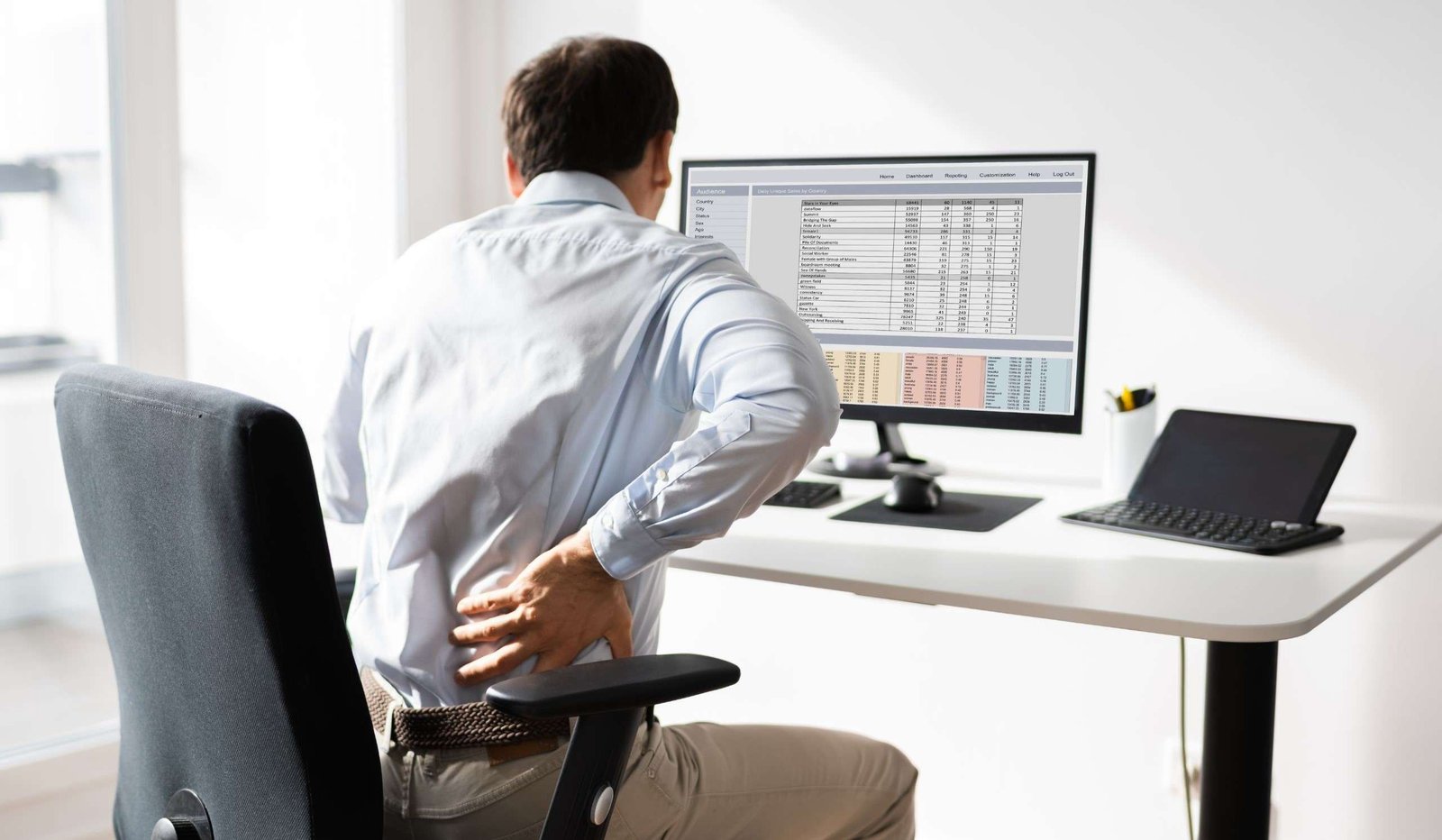
If your 9–5 is leaving you stiff, tired and stressed, you’re not alone — Desk Job Health Problems are common. This post explains the main problems desk work creates, simple Ayurvedic and evidence-based solutions you can use today, a short 7-day starter plan, safety notes, and when to get personalised help. For a tailored plan that fits your schedule and constitution, get a consultation from Vedic Upchar: https://vedicupchar.com/doctor-consultation
The problem
Desk Job Health Problems often begin with long sitting, poor posture, irregular meals, low movement and high mental load. Typical symptoms: neck/shoulder pain, low back pain, eye strain, headaches, digestive slowdown, weight gain, fatigue, mood dips and poor sleep. From an Ayurvedic view, these arise from Vata (stiffness, dryness) and Kapha (sluggishness) imbalances plus weakened agni (digestive fire). Fixing them means changing micro-habits at work and supporting the body with simple Ayurvedic routines.
Quick list — common desk-related issues
- Neck and shoulder stiffness (tech neck)
- Lower back pain and tight hips
- Eye strain, dryness and headaches
- Digestive slowing, bloating and irregular bowel movements
- Low energy, poor concentration and irritability
- Weight gain and poor metabolism
- Sleep problems from screen overuse and stress
Practical Ayurvedic + practical solutions for Desk Job Health Problems
1) Ergonomics: fix the basics first
- Screen at eye level; top of screen about eyebrow height.
- Feet flat, knees ~hip level; use a small footrest if needed.
- Keyboard and mouse close to avoid shoulder reach.
Small changes reduce strain immediately.
2) Micro-breaks & movement every 30–45 minutes
- Stand, stretch or walk 1–3 minutes every work block.
- Try 5 deep breaths, shoulder rolls, and a brief neck circle.
Movement prevents Vata stiffness and improves circulation.
3) Desk-friendly yoga & stretches (do at your chair)
- Neck rolls, seated cat–cow, seated spinal twist, standing forward fold, hip opener (figure-4 stretch).
- Do 1–2 minutes of gentle stretches hourly to loosen hips and low back.
4) Short pranayama breaks for focus and calm
- Anulom Vilom (alternate nostril breathing) 3–5 minutes reduces anxiety and sharpens focus.
- Bhramari (bee breath) 2–3 rounds for instant calm before a stressful meeting.
5) Eye care to prevent digital eye strain
- Follow the 20-20-20 rule: every 20 minutes, look at something 20 feet away for 20 seconds.
- Blink deliberately and use a humidifier if air is dry. Consider blue-light filters in evening.
6) Food & digestion — small, regular, warm meals
- Make lunch your main cooked meal (Agni strongest at midday).
- Avoid cold drinks with meals; sip warm water or herbal tea (ginger or jeera).
- Carry light, healthy snacks (nuts, fruit) to avoid bingeing on sugary foods.
7) Abhyanga (short self-oil massage) & nightly wind-down
- 5–10 minute self-massage with warm sesame or almond oil on evenings relaxes muscles and calms Vata.
- Finish with a warm shower. This helps sleep and recovery from desk strain.
8) Adaptogenic and supportive herbs (use under guidance)
- Ashwagandha for stress resilience and sleep support.
- Shatavari or guduchi for gentle restorative support when advised.
- Triphala at night for regular bowel movements and digestive tone.
Always consult before combining herbs with medications.
9) Movement prescription — weekly targets
- Aim for 150 minutes moderate activity per week (walking, yoga) plus 2 resistance sessions to protect muscle and posture.
- Short walks after meals aid digestion and break sedentary stretches.
10) Sleep hygiene & screen curfew
- Stop screens 60 minutes before bed; create a wind-down routine (warm foot bath, reading, pranayama).
- Consistent sleep time helps repair tissues and balance hormones.

Quick 7-day starter plan to tackle Desk Job Health Problems
- Day 1: Ergonomic check (screen, chair, keyboard); set a 45-minute timer for breaks.
- Day 2: Add 3× 2-minute desk stretches + 1 midday 10-minute walk.
- Day 3: Begin morning warm water and 5-minute pranayama.
- Day 4: Try 5-minute Abhyanga in the evening and earlier dinner.
- Day 5: Add Triphala at bedtime if digestion sluggish (after consulting clinician).
- Day 6: Do a 20-minute yoga session focused on back and hips.
- Day 7: Reflect: note pain, sleep, energy; book a consult if problems persist.
When desk problems need medical or specialist care
- Severe/constant pain, numbness, or leg weakness — see a doctor or physiotherapist.
- New or worsening headaches, visual changes or chest symptoms — urgent medical review.
- Digestive bleeding, unexplained weight loss, or persistent insomnia — medical tests recommended.
For an integrated approach that combines ergonomics, Ayurvedic herbs, personalised routines and referrals to physiotherapy or tests, get a consultation from Vedic Upchar:
👉 https://vedicupchar.com/doctor-consultation